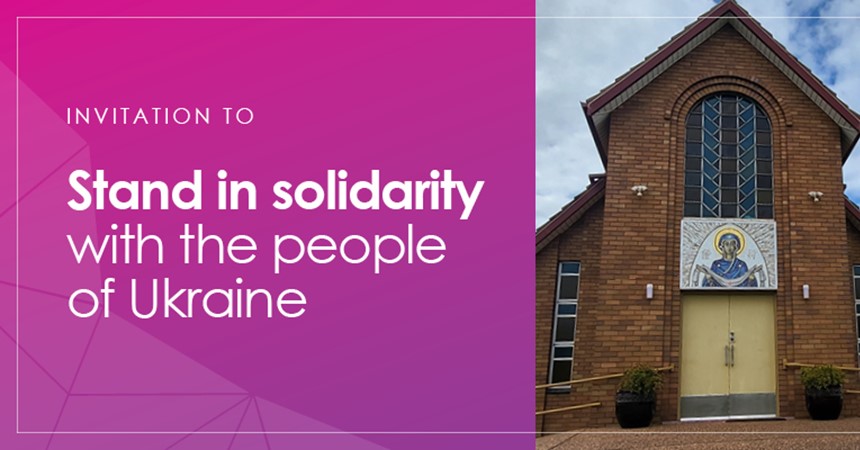You are also invited to morning tea at 11am on Sunday 27 March following their Sunday Mass, in the hall at 105 Gosford Road, Adamstown. Please bring a plate of food to share with the Ukrainian community.
Fr Greg Barker encourages us to unite with Pope Francis in the Prayer for Peace and Justice in Ukraine during our Masses over the weekend.
You can read more about how Caritas is helping the people of Ukraine here: Ukraine | Caritas Australia.
Consecration chooses life
Pope Francis has taken a significant step in his condemnation of war in Ukraine and promotion of peace. He has dedicated this Friday (25 March) to the consecration of Ukraine and Russia to the Immaculate Heart of Mary. The day is also the Feast of the Annunciation, celebrating Mary’s acceptance of the invitation to become the mother of Jesus. The gesture echoes his prayer on Ash Wednesday, ‘May the Queen of Peace preserve the world from the madness of war’.
He has invited all the Catholic Bishops of the world to join him in making the consecration.
The Pope’s move is bold. It implies that prayer is universal and crosses all national boundaries. In times of war this is not a popular position. We mostly insist that God is on our side and absent on the opposed side, and often see prayer that includes our enemies as a surrender to moral equivalence. Some, too, would say that the Pope has no right to consecrate nations to Mary without asking their permission.
But precisely because of this instinctive partisan response it is necessary to pray for the people on both sides and to see war as the enemy that wounds the people whom God loves. Both the Roman Catholic and the Orthodox Churches share a common devotion to Mary as the Mother of God, expressed in their liturgy, hymns and art. It is a rich part of their tradition. In times of crisis the faithful pray through Mary.
That said, the devotion to the Immaculate Heart of Mary is a Western innovation. It was approved by Rome, too, at a time of some tension between Churches. The Roman Catholic Church was preparing to define as divinely revealed the doctrine of the Immaculate Conception of Mary. This was questioned by Protestant Christians on the grounds that it was not contained in Scripture and by the Orthodox on the grounds that it did not have the assent of the first eight Ecumenical Councils before the split between East and West.
The consecration of Russia to Mary, too, became clouded by the apparitions of Mary at Fatima at the time of the Bolshevik Revolution in Russia. Although Popes subsequently consecrated the world to Mary, but not specifically nations, and held back from some of the more fervent anti-Communist commentary that accompanied the promotion of Fatima, the consecration of Russia remained a source of tension.
For that reason, the consecration of Russia can easily be seen by Russians as a hostile Western gesture directed against both the people of Russia and the Orthodox church. It can easily be misrepresented as anti-Russian.
That view of a homogeneous Russia and Ukraine, however, does not do justice to the diversity both of Russia and of Ukraine. A small proportion of Russians (1% by 2005 figures) belong to the Catholic Church, compared to 53% Orthodox and 27% non-religious. In Ukraine the majority (71.4 %) belong to one or other of various Orthodox groupings, and 9.4% to the Catholic Church that celebrates its liturgy in the Eastern rite it shares with the Orthodox (2018 figures).
Consistent with Pope Francis’ governance of the Roman Catholic Church, his first concern in making this gesture, however, is not to avoid misunderstandings but to focus directly on what God wants for God’s people and what Christ came to offer: namely, life. The consecration is an opportunity for people in all nations to wish that the people caught in conflict will be offered and choose life over death, and will pledge allegiance to a God who makes peace over the false gods that foment war. No one comes to prayer, particularly not in times of war, with clean hands and an irreproachable conscience. They are things we might aspire to and find help to attain through our prayer. That is why 25 March this year will be a big day as we associate ourselves with Pope Francis.
Author: Fr Andrew Hamilton SJ. Originally published on Australia Catholics Education Hub 21 March 2022.
